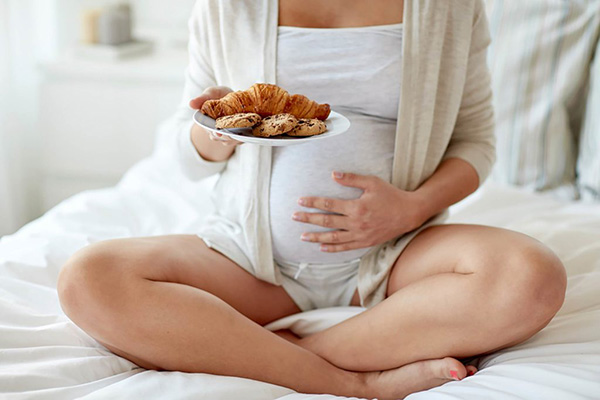
Pregnancy cravings explained
There are a lot of theories why pregnancy cravings occur including hormonal changes, altered sense of smell, and nutrient deficiencies. In reality it’s likely that all three factors play a role and these cravings are trying to tell you something about what’s going on in your body. Some of the more common cravings include:
- Sweets and chocolate:
- Sugar cravings may partly be related to the increased caloric requirements that occur with pregnancy. You’re growing a human being and keeping yourself going so more calories will be needed. The other reason for sugar cravings is the changes in insulin sensitivity. Blood sugar levels can become erratic and this can influence your desire for sweet foods.
- Chocolate cravings in particular may be related to magnesium deficiencies. During pregnancy magnesium contributes to fetal development (Bone, nerves, muscle) and prevention of leg cramps and pre-eclampsia. Alternative food sources of magnesium include oats, quinoa, brown rice, spinach, kale, nuts, and seeds.
- Salty foods:
- During pregnancy there is 40-50% increase in blood volume. This means that you gradually produce more blood throughout pregnancy to make sure your baby is receiving all of the oxygen and nutrients that it needs. Salt is an important component of blood so it makes sense that this is a common craving. Unfortunately salty foods are often unhealthy ones such as chips, fast food, and condiments.
- Meat:
- Sometimes cravings come in the form of steak and burgers. This can possibly be pointing towards the body’s need for more protein or iron. Requirements for both nutrients are higher in pregnancy to help the growth of the baby.
- Ice and non-food items:
- This might sound shocking but it isn’t uncommon to hear about women craving ice, sand, gravel, and other non-food items. The medical term for craving non-food substances is pica and can mean nutrient deficiencies are occurring, specifically iron, zinc, and calcium. If this is occurring it is important to discuss these cravings with your doctor so that appropriate testing and supplementation can be done.
Usually cravings aren’t concerning (Unless it is pica) but can contribute to unintended weight gain. During a normal pregnancy 25-35 pounds of weight gain should be expected although this will vary from person to person. If too much weight is gained gestational diabetes, high birth weights, and higher rates of cesarean sections can be seen. Because of this it is important to eat nutritious foods that may help prevent cravings from happening in the first place.
Healthy foods for pregnancy:
- Nutrient dense foods: Dark leafy greens, berries
- Healthy fats: Nuts, seeds, avocados, fish
- High quality protein: Organic meats, fish, eggs, lentils,
- Complex carbohydrates and fiber: Various fruits and vegetables, flax, chia

